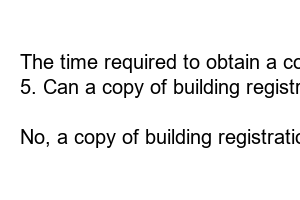건물등기부등본
Title: Copy of Building Registration: All You Need to Know
Subheadings:
1. What is a Copy of Building Registration?
2. Why is a Copy of Building Registration Important?
3. How to Obtain a Copy of Building Registration?
4. What Information Does a Copy of Building Registration Contain?
5. Can a Copy of Building Registration Be Altered or Falsified?
6. What Are the Consequences of Not Having a Copy of Building Registration?
7. Frequently Asked Questions (FAQs) about Copy of Building Registration
Introduction:
Whether you’re a homeowner or a potential buyer, understanding the importance of a copy of building registration is crucial. This document is not only legally required in many jurisdictions, but it also serves as proof of the building’s authenticity and compliance with building codes. In this blog post, we will delve into everything you need to know about a copy of building registration.
1. What is a Copy of Building Registration?
A copy of building registration is an official document provided by local authorities that certifies a building’s compliance with safety regulations and other administrative requirements. It serves as evidence that a building has been approved for construction and is legally registered.
2. Why is a Copy of Building Registration Important?
Having a copy of building registration is essential for several reasons. Firstly, it ensures that the building has been constructed in compliance with the applicable building laws and regulations, thereby guaranteeing the safety of its occupants. Furthermore, it confirms that the building has obtained all necessary permits and approvals, providing peace of mind to owners and potential buyers.
3. How to Obtain a Copy of Building Registration?
To obtain a copy of building registration, you typically need to contact the local building authority or municipality where the building is located. The process may involve submitting a formal application, paying any applicable fees, and providing relevant documentation such as proof of ownership or occupancy.
4. What Information Does a Copy of Building Registration Contain?
A copy of building registration contains essential information about the building, including its address, owner’s name, details about the construction, and the date of registration. It may also include information about any alterations or renovations made to the building over time.
5. Can a Copy of Building Registration Be Altered or Falsified?
Due to the crucial nature of a copy of building registration, altering or falsifying it is illegal and can lead to severe consequences. Authorities often have stringent measures in place to prevent forgery, such as issuing unique registration numbers and incorporating security features into the document.
6. What Are the Consequences of Not Having a Copy of Building Registration?
Not having a copy of building registration can result in several negative consequences. Firstly, it may hinder potential buyers from securing financing or insurance for the property. Moreover, if authorities discover that a building is not registered, owners could face fines, penalties, or even demolition orders.
Frequently Asked Questions (FAQs) about Copy of Building Registration:
1. Is a copy of building registration the same as a building permit?
No, a copy of building registration confirms compliance with building laws and serves as proof of the building’s existence, whereas a building permit grants permission for construction.
2. Can I obtain a copy of building registration for an older building?
Yes, in most cases, you can obtain a copy of building registration for older buildings. However, the process may vary depending on local regulations and the availability of historical records.
3. Can a copy of building registration be transferred to a new owner?
Yes, a copy of building registration can be transferred to a new owner upon the sale or transfer of the property. The new owner should update the registration to reflect their details.
4. How long does it take to obtain a copy of building registration?
The time required to obtain a copy of building registration varies depending on the jurisdiction and the complexity of the process. It may range from a few days to several weeks.
5. Can a copy of building registration be used as a legal document?
Yes, a copy of building registration holds legal significance as it proves the building’s compliance with regulations. It can be used as evidence in legal matters related to the property.
6. Is a copy of building registration the same as a certificate of occupancy?
No, a copy of building registration and a certificate of occupancy are separate documents. A certificate of occupancy confirms that a building meets all applicable safety standards and is fit for occupancy.

